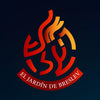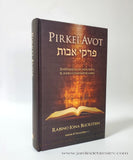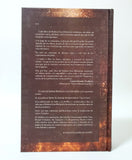An essential book!
The Mishna, "Pirkei Avot"
Complete edition, Hebrew Spanish with comments. Hardcover edition, more than 540 pages.
The literal translation of Pirkei Avot, is "The chapters of the Avot", our fathers, thus referring to the sages and teachers, whose indications and teachings we will study in the chapters of this Treaty. And why is it called Avot?
Explains the author of "Tiferet Israel ": because all the principles of conduct that We find in all the works of Israel and the peoples of the world All without exception they are found in the chapters of the book of Avot. We read what Rabbi writes Ovadia de Bartenura, author of the comment to the Mishnah:
“.... because this treatise is not organized as a commentary to a precept, of the precepts from the Torah" (613), What
the rest from the Treaties Mishnatics but it is about moral and virtue teachings, and since the wise men of the earth also wrote similar books of moral ethical content and the behavior of man towards others, which were conceived from their own hearts, the Tanaite began the Treatise stating that Moshe received the Torah from Sinai, to tell you that the virtues and moral teachings of the same, were not conceived by the sages of the Mishnah, from their own hearts, but also heard they igined at Sinai. Rabbi Yehuda Hanasí, president of the Sanhedrin, was the compiler of the Mishnah, it would be interesting to ask, why did you choose the principles cited in the Treatise, and what were the parameters of your choice? The Rabbis tell us that Rabbi Yehuda chose those rules and aphorisms that he set as pattern for daily behavior; as cough teaches efta in Iebamot 8 :. Said Rabbi Eleazar ben Azaria
“Good are the concepts that come out of the mouths that apply ”.
Leading by example is not an easy thing, but the great Rabbis of each generation they teach that it is not impossible. "Good qualities are achieved after struggles internal with the "Ietzer will do ”(evil instinct) and are the result of ethical and moral conduct whose goal is to achieve the perfection that Gd ordained us. Us would remain a point for clear out, for what reason the Treaty from Avot I know finds in the volume "Nezikin", the fourth of the volumes that make up the Mishnah, which deals with the system
legal, similar damages? ...
world to come ”, because if the wise think that both the righteous and the wicked, without
exception, they have part in the world to come, then they are all equal, and this is a
impossible reality; for HaShem, because it is written: "HaShem is honest
and without injustice,
just and upright is He ”(Debarim 32: 4).
If the wise say that everyone who calls himself "Israel" is assured that he will be a righteous
male and that is why he has a part in the world to come, this too is impossible, because the reality proves us, that there are many Hebrews who are agnostic, and the Talmudic source quoted above, he adds, that they have no part in the world to come.
The author of "Akedat Yitzchak" explains to us that the intention of our sages, is to tell us
that everyone, who is considered Tzadik (righteous), is considered Israel. Each member of our people are committed to conducting themselves according to the Torah and its precepts, and if so
then he will be considered a "Tzadik", just male.
And now it is clear that “everything that is part of the world came
dero, is considered Israel, not
in name only, but in essence ”(Shaar Shishim).
When he says "All Israel", he does not exclude the pious and upright of the peoples of the world,
Rabbi Moshe Ben Maimon (Maimonides), fails to say that he who fulfills the seven precepts of Noah (Noah) , because the ord enó He Holy Blessed be He, in the Torah, for source of Moshe, our teacher, is considered one of the pious of the nations of the world, and merits a portion in the world to come (Laws of Teshuva repentance 3: 5).
They asked the Chafetz Chaim Why do we go out of our way to get people to study
Torah? If the wise men "promise" us that all Israel (has a part) in the world to come
I will tell you something that happened, the Rabbi replied:
In the city of Kiev, there was a very rich and famous man, his name was Israel Brodsky, it had many factories, and a large number of workers, accountants, and executives. Each from them he received his salary according to his hierarchy.
This man was very giving and charitable and his hand was open to all, different institutions received their help, as well as families who had fallen apart, in particular he helped his poor relatives, to whom he gave a monthly sum.
All this was written in his books and as a custom he visited his factories from time to time in weather.
Once, he came to visit one of its factories, in the company of the top executives of his company, they introduced him to the heads of the different departments, whom he greeted, asking them about the position they held aban, the salary they received and others like it.




